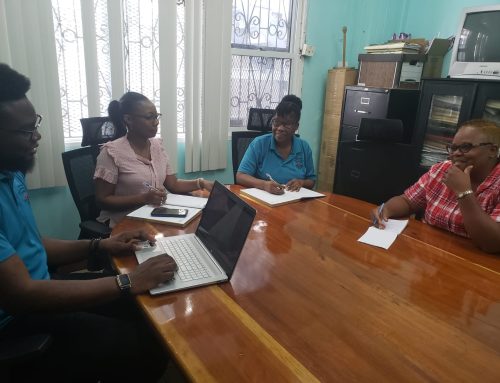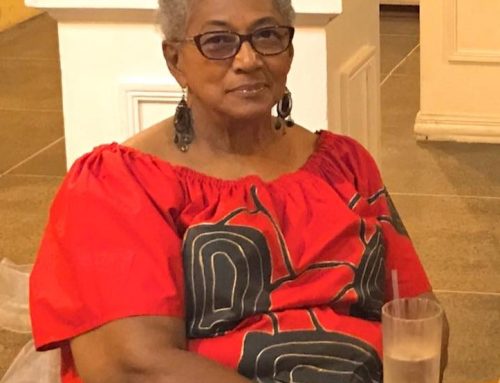Guyana Council of Organisations for Persons with Disabilities
Chairman – Mr. Cecil Morris: Message for IDPWD 2021
ON this day, as we observe International Day of Persons with Disabilities under the theme “Leadership and participation of persons with disabilities towards an inclusive, accessible and sustainable post-COVID-19 world”, let us be reminded THAT the community of persons with disabilities still remains a vulnerable and marginalized group within our Guyanese society. The plethora of issues plaguing the lives of PWDs are still present. Each year we highlight the circumstance of this marginalized group in our population with the hope of long term structural sustainable changes. However, this is far from becoming a reality.
Over the past year, much has been done by the Government of Guyana to include persons with disabilities, and measures to alleviate the impact of the pandemic on the lives of pwds have been implemented. While the community of PWDs has received some benefits, we are still a far way from the achievement of full inclusion. This can only be achieved through the implementation of the contents of the Guyana PWD Act 2010 in a timely manner.
Moreover, the current COVID-19 Pandemic has exacerbated the circumstances of PWDs. There is a need now, more than ever to promote an understanding of the issues that hinder the independence, development and productivity of this group. Yes, we do recognize all Guyana and the World have suffered and continue to suffer, however due to their social location PWDs were more severely affected.
It is no secret that this community of vulnerable people has always been forced to live on the fringes of society, resulting from the stigma and discrimination and social barriers they have to face on a daily basis.
The United Nations (UN) has aptly coined this year’s theme, “Leadership and participation of persons with disabilities toward a Disability Inclusive, accessible and sustainable post COVID-19 world”, for this year’s IDPWD observances. This theme was not just chosen without reason. The UN has recognize the difficulties PWDs have faced during the pandemic and the need for the inclusion of this community in rebuilding our country post COVID-19.
Closer to home, this theme has a lot of significance for us as a country, not just in rebuilding the economy post COVID-19, but as we prepare for the explosion in our growth and development, facilitated by the oil and gas sector. As a national civil society umbrella organization, we the members of the Guyana Council of Organizations for Persons with Disabilities (GCOPD) are once again reiterating the need for government to meaningfully engage and include PWDs in the development agenda. We want to live in a Guyana that is inclusive, equitable and accessible for all PWDs. We want a Guyana where PWDs are viewed through the human-rights lens as equal citizens and not objects of charity. It is time that the culture in Guyana towards PWDs be positively transformed. In order for this positive transformation to occur in the disability landscape, all Guyanese have a role to play not just the government.
We do recognize and appreciate the strides we have made as a country to promote and fulfill the rights of PWDs. The Guyana PWD Act was enacted in 2010 under the leadership of former President Dr. Bharrat Jagdeo. This was a significant development for the disability community. It has provided the legal framework to create the enabling environment to promote a more inclusive and accessible Guyana, however progress in this area has been limited. This lack of progress can be attributed to the reluctance from some stakeholders to implement the contents of the legislation. As a consequence of this lack of implementation, major issues and gaps exist in PWDs accessing their inherent human rights, thus being unable to live independent lives. For this missive the focus would be on three rights areas, accessibility, education and employment.
It is explicitly stated in the Guyana PWD Act that all public buildings should be accessible for all PWDs. Unfortunately, this is not the reality. PWDs who are wheelchair users and with mobility challenges are unable to access the majority of public buildings. Sadly, there is no movement to make these existing buildings accessible and wheelchair friendly. We are seeing an increase in the construction of new buildings for public access, but the majority of these structures are inaccessible for PWDs. Our building codes are not properly enforced and these building owners are allowed to construct buildings that are inaccessible; hence discriminating against PWDs. Remember PWDs have the right to access and have a desire to be independent. This is only possible if our public buildings are accessible. Note, not just the entrance, but the interior of the buildings. We must have accessible washrooms, wide doorways, etc. It must be highlighted that our sidewalks are an absolute nightmare for PWDs to traverse. Persons who are blind and persons who are wheelchair users cannot use these walkways. They are forced to use the roadways, putting themselves in the path of danger. We need to ensure our sidewalks and all public spaces are accessible to all including PWDs.
In the area of education, there are significant shortcomings but we are making some strides forward. It is a fundamental right of all children to have a meaningful education. However, for Children with Disabilities (CWDs), this is not always the reality. There are a number of factors that contribute to the lack of access to education for CWDs. However, the focus for this piece is on the role of parents, guardians and other family members. While we recognize that the Ministry of Education (MOE) can do more to ensure CWDs are able to access a meaningful education all across Guyana, it is also the responsibility of the parents and guardians to ensure that they play a more active role in their children’s education. Many times, the responsibility is left up to the teacher and in this pandemic, it is nearly impossible for the teacher to adequately meet the child’s needs remotely. Thus, the collaboration of stakeholders, especially parents, is important to ensure that no CWD is left behind. In addition, it is the role of the parents and guardians to facilitate measures to ensure that their children have access to education, instructional time with their teacher and educational resources and materials. Education is an investment into a child’s future, therefore we call on our parents and guardians of CWDs to recognize this and take actions to invest in their child’s future.
Transitioning to the field of work, the right to employment is an elusive dream for the majority of PWDs.
Qualified and skilled working age PWDs are still unable to access employment in this modern age. This lack of employment opportunities can be attributed to employers being uninformed about the capabilities of PWDs. Most persons are of the view that these individuals are unable to work and cannot be productive. This lack of awareness of the abilities of PWDs is grounded in the culture that exists in which PWDs are viewed as dependents and objects of charity. Resulting from this misconception and inequity, the majority of PWDs lives in poverty and are dependent on charity for their survival. This is not the way PWDs want to live in a developed society. In a post COVID-19 Guyana, PWDs want to have more employment opportunities both in the public and private sectors. We are optimistic that this would be realize, premise on our discussions with His Excellency Dr. Irfaan Ali and some of his ministers and with the efforts of Her Excellency Arya Ali in advocating for the employment of PWDs.
As we observe IDPD 2021 and plan for a post COVID-19 Guyana, one of our main focus should be on creating a rift in the intimate relationship between disability and poverty. For two long, we have allowed this relationship to flourish causing great hardship on a community of approximately forty eight thousand (48,000) persons (2002 National Population Census).
As we move forward to build a better and inclusive Guyana in an oil and gas economy, we should ensure that PWDs are not left behind and are included in all aspects of development and society as equal partners. We need all stakeholders to work in unison to ensure PWDs have an equal opportunity to live independent productive lives. Guyana, do remember anyone can acquire a disability.


